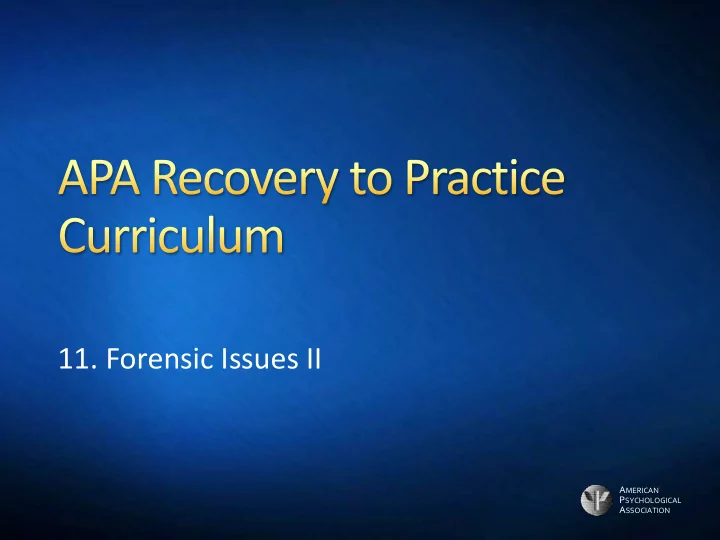

11. Forensic Issues II A MERICAN P SYCHOLOGICAL A SSOCIATION
Essential Components of Recovery Service Provision are Missing in Most Criminal Justice Settings: Respect Autonomy Person centered Evidence based practices To Break the Cycle of Incarceration, Release, Symptom Exacerbation, and Re-incarceration: Mix of services Designed for and with the individual Tailored to his or her complex needs Many Complex Dynamics in Such Settings – Requires Resources not Typically Available A MERICAN P SYCHOLOGICAL A SSOCIATION
Interventions for People with Serious Mental Illnesses in the Criminal Justice/Forensic System Where provided, medication – often too much Currently only provided in the best facilities – social learning programs to improve adaptive behaviors Clinical interventions adapted for justice involved population: Forensic Assertive Community Treatment CBT Concurrent Disorders Treatment Supported Housing Essential & critically needed for this population: Trauma informed & specialized services A MERICAN P SYCHOLOGICAL A SSOCIATION
Forensic Assertive Community Treatment (FACT) Distinguished from ACT in four ways: Participants have criminal justice histories Preventing arrest and incarceration are explicit outcome goals Majority of referrals come from criminal justice agencies Supervised residential treatment is incorporated into the program Supported Housing Usually offered together with FACT Considered important for keeping people connected to treatment and out of the justice system A MERICAN P SYCHOLOGICAL A SSOCIATION
Cognitive Behavioral Therapy (CBT) Improves interpersonal functioning & reduces impact of substance misuse Considered essential for those with conduct disorders & antisocial personality disorder Aims: Control anger, reducing aggression Impulsivity , violent behavior Maladaptive patterns of thinking Associations with pro-drug and antisocial peers poor social skills A MERICAN P SYCHOLOGICAL A SSOCIATION
Concurrent Disorders Treatment Extremely high rate of co-occurring substance abuse and mental health disorders among forensic/criminal justice populations Treatment widely recognized as essential Components include: Psychotropic medication Motivational interviewing CBT interventions Providers must: Engage the person and encourage commitment Take steps to ensure continuity of care from one setting to another Provide comprehensive services Provide on-going assessment and services tailored to the needs of each individual SAMHSA GAINS Center, Treatment of People with Co-occurring Disorders in the Justice System (undated) A MERICAN P SYCHOLOGICAL A SSOCIATION
Trauma Informed Specialized Care Severe trauma is so prevalent that it is considered the norm for this population – virtually 100% for women Many have developed extreme coping strategies Requires specialized professional training For women, especially important and NOT in mixed group! A MERICAN P SYCHOLOGICAL A SSOCIATION
Trauma Informed Specialized Care, cont’d Components: Learning skills for coping with anxiety (such as breathing retraining or biofeedback) and negative thoughts (cognitive restructuring) Managing anger Preparing for stress reactions (stress inoculation) Handling future trauma symptoms Addressing urges to use alcohol or drugs when trauma symptoms occur (relapse prevention), and Communicating and relating effectively with people (social skills or marital therapy) Trauma Informed Specialized Care is essential for this population! A MERICAN P SYCHOLOGICAL A SSOCIATION
Mental Health Courts Specialized court dockets: Deal exclusively with people with mental health disorders in the criminal justice system Combine community treatment services with criminal justice supervision Provide a range of high intensity interventions needed by this population Mental health courts hold promise of helping individuals remain out of the forensic/criminal justice system and achieve a stable and satisfying life in the community A MERICAN P SYCHOLOGICAL A SSOCIATION
Transition Planning and Follow up - Essential but Usually Lacking Inadequate transition planning puts people with co-occurring disorders who enter jail in a state of crisis back on the streets in the middle of the same crisis The period immediately after release is critical – the first hour, day or week can determine success or failure - high intensity interventions that support the person during this time are essential Without immediate monitoring and follow up many miss the first crucial health and social service appointments: Do not have medications End up on the street Quickly return to the criminal justice/forensic system A MERICAN P SYCHOLOGICAL A SSOCIATION
If People with Serious Mental Illness in the Criminal Justice and Forensic Systems are to Succeed WE MUST PROVIDE: Complete range of clinical and justice related interventions aimed at ensuring best psychological treatment, proper housing, and successful employment for those who can work Superior transition planning Help with medical and mental health follow up Community integration that diminishes stigmatization A MERICAN P SYCHOLOGICAL A SSOCIATION
Citation for this Module: American Psychological Association & Jansen, M. A. (2014). The Forensic System and Related Issues II: Interventions, Transition Planning, and Follow Up. Reframing Psychology for the Emerging Health Care Environment: Recovery Curriculum for People with Serious Mental Illnesses and Behavioral Health Disorders. Washington, DC: American Psychological Association. www.apa.org/pi/rtp Citation for the full Curriculum: American Psychological Association & Jansen, M. A. (2014). Reframing Psychology for the Emerging Health Care Environment: Recovery Curriculum for People with Serious Mental Illnesses and Behavioral Health Disorders. Washington, DC: American Psychological Association. mjansen@bayviewbehavioral.org or jansenm@shaw.ca A MERICAN August, 2014 P SYCHOLOGICAL A SSOCIATION
Recommend
More recommend